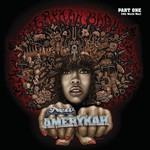New Amerykah, Part One (4th World War)
Studio Album by Erykah Badu released in 2008Amerykahn Promise | |
The Healer | |
Me | |
My People | |
Soldier | |
The Cell | |
Twinkle | |
Master Teacher | |
That Hump | |
Telephone | |
Honey |
New Amerykah, Part One (4th World War) review
Erykah Badu's attitude to life, America and herself
On February 26 one of the most eccentric singers of the present days, the founder of neo soul genre Erykah Badu celebrated her thirty-seventh birthday marking this event with the release of her third full length album New Amerykah, Pt. 1: 4th World War, the first part of New Amerykah collection. Her inimitable eclectic brand style of performance that amazed the world in 1997 when her brilliant debut creation Baduism was released makes each song she sings a work of art which is confirmed by numerous awards including several Grammies. Erykah's second record, 2003's Worldwide Underground, proved to be more nonstandard than the first work but as it now turns out it was only a bridge to what the third album presents in itself. As the performer confesses herself it is the unusual, passionate music she has always dreamt to record, and the much personal texts on New Amerykah, Pt. 1: 4th World War express Erykah Badu's civil position and attitude to life, America and herself.
A pure flow of music on New Amerykah, Pt. 1: 4th World War
On New Amerykah, Pt. 1: 4th World WarErykah Badu practically denies the standard song structure of verses and choruses instead letting us enjoy a pure flow of music. An absolutely amazing production by Madlib, 9th Wonder and Sa-Ra greatly adds to the singer's unsurpassed performance. The album opens with conceptual composition Amerykahn Promise on which a male voice praises the government, and a child's one makes one understand that everything it promises is all fake and false, whereas The Healer with a faultless bass line is a slower reflective song with Erykah's soft vocals and a choir in the background. The most personal track Me refined with tubes and a melody impossible to imitate is close to jazz, but a funky beat makes it so complicated and artfully disharmonious, at the end the track gets sentimental and strange. Almost danceable if not oppressive composition My People sounds somewhat endlessly sad, and R&B beat on Soldier, another embodiment of the album's ideas serves a perfect background for the singer's wonderfully powerful vocals. Multilayer sounding on The Cell is built around a very simple tune, while the longest tracks here are Master Teacher, on which several interrupting each other vocal parties create the background for Badu's gentle singing with a changing tune, and a slower number Telephone again not devoid of jazz elements. At the end of the record there is a surprise for us, on Bonus Track the singer is first talking to the listeners and then presents us with a hidden single Honey, the only the one song with verses and a chorus and a distinct tune played on all levels.
Not a simple album for apprehension
It is quite an undertaking to single out a clear stylistic direction both on New Amerykah, Pt. 1: 4th World War and its predecessors for the main factor for Erykah Badu is the music itself, the creative work as it is without any boundaries and definitions. If before her creations that are always lively and natural were somewhere close to hip hop and R&B now she has obviously decided to explore the possibilities of funk, but this by no means implies that the new work can be classified as her funk album. Erykah seems to be testing her fans' toughness with this record balancing on the edge of harmonious and disorderly, hard and soft, opening her political views from song to song using expressions that are far from being flattery or just depicting the scenes of the severe reality. Not a simple album for apprehension New Amerykah, Pt. 1: 4th World War is most complicated patterns of tunes and voice overlapping combined with a bit that is often unexpected. One should give this work more than one listening to appreciate all its nuances and then it will be clear what music means for Erykah Badu and what we can expect from her to come.

